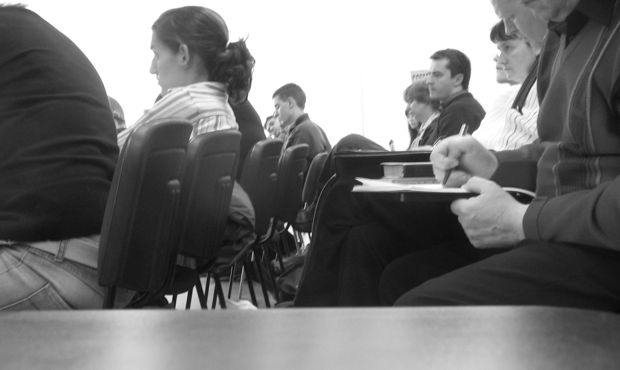Worry and love fuel my prayers for each student. I pray, from my first years of teaching at The University of Georgia during grad school through my many years of teaching here at Shorter, that every class will become a learning community in which students see each other as fellow humans who experience difficulties, talents, struggles, and triumphs.

Problems exist and threaten this goal. One semester I was told that a student in a group project was not pulling his weight. The other students in that group didn’t storm my office with this news; they were hesitant, if clearly frustrated, and the complaint emerged as we were en route to the library under crepe myrtles that had already bloomed and faded. I reminded them that my group project design allows for maximum getting-to-know-each-other opportunities and minimum grade damage, that one student’s weak participation won’t adversely affect others’ group grades, and that the group project itself is not weighted enough to capsize a student’s semester average.
When my husband was involved in group projects in graduate school, such complications could be severe. As MBA students, supposedly experiencing the “real business world,” they were required to cut-throat grade each others’ performances. I’m sure some professors handle that kind of approach well, but it’s not my style. I get more from students by giving them a chance in group projects to get to know each other and to learn the joy of collaborating creatively, with the peer-pressure incentive of their presenting to the class what they’ve learned.
I told the exasperated students to leave it to me and to focus instead on their group presentation. Then I went off and prayed about the one student they said was not turning up for their meetings. It always bothers me when a student isn’t doing what I consider to be his or her best, which is one reason I stop and pray in such a situation, which I did. Then I called him into my office, saying I’d like to get to know him better, and we had a chat. I asked how school was going. I learned a little about the struggles he was facing and how his studies were suffering, and I offered my help. Years later, I read a newspaper article about the extreme hardships that student had encountered while in college, beyond even what I’d been told, and I was thankful prayer had helped me to respond rather than react. Now this student is thriving.
Another challenge to creating community includes trying to motivate students whose minds are on a million other topics. Teaching a generation that has fallen down the Alice-in-Wonderlandish rabbit hole of technology requires prayer because the combination of developing maturity and Instagram results in late or missed assignments.
And not all are academic success stories. Once, a student I was tutoring in Freshman English proudly showed me his poster for a presentation, asking, “Isn’t it great?” I admitted it was (frankly, I was astonished how terrific it was because he’d often missed turning in assignments); then he added, “My mom made it!” I wish I could say that this student earned a passing grade in Freshman English. I knew he was smart, but the effort wasn’t there, no matter how I encouraged it and prayed for him.
After that particular Freshman English class was over, this student would often see me in the hallway or in town, and I figured he would not want to interact — but I would always hear, “Dr. Butcher! How are YOU!” long before I could locate where the voice was coming from. He knew I respected him and loved him. That is the result of prayer.

I pray for students often because praying for each one makes me stop and consider who they are and not who they might be in my preconceptions. On my knees in front of my brown office sofa (that students say looks like a pachyderm’s skin after a dust bath), at the start of a semester, I place lists of my students’ names on the cushions beside me, and I pray for them, name by individual name, as a way of beginning to know them as people. I don’t know their heartaches and fears, but God does. I ask him to help me love them and teach them. Communication is a tricky process, and I am keenly aware that I need all the help I can get.
Facebook helps because in a wonderfully random fashion my newsfeed offers updates on present and former students as they share their lives. Each summer, I see many former students enthusiastically cutting-and-laminating work for bulletin boards, sharing pedagogical ideas as they prepare for new school years in K-12 settings; one is a columnist for a national peer-reviewed medical school journal; another is in a graduate school in Scotland; many are in graduate school elsewhere; a future doctor has recovered from hip surgery; many travel to invest their lives in others’ futures; some are now proud dads and moms, and on and on.
Such memories remind me to take the long view. The student somewhat skeptical of English grammar today may tomorrow be teaching high school English and asking students to diagram and doing a fine job of it. I am reminded that if I pray daily for students I will be better able to rise above the daily aggravations that life and jarring personalities can bring, to see the best, and to encourage it with God’s love. If I pray daily for students, then something invisible of infinite, non-ephemeral worth will occur.
To do this, I must remain a student of the Teacher: “I will instruct you and teach you in the way you should go; I will counsel you with my loving eye on you” (Psalm 32:8) With God’s help, I will.